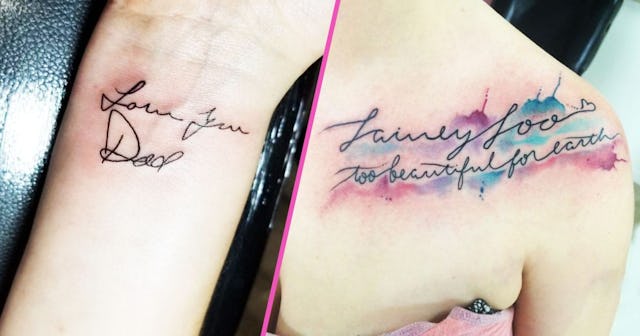My Memorial Tattoo Allows Me To Wear My Grief On My Body

Trigger warning: child loss
I’ve never been a person who handles needles with my dignity intact, but I consider tattoos to be a beautiful form of artwork and outward expression. To me, the buzzing is soothing, the clean atmosphere is cleansing, and the end result is worth every needle-prick of my pain. The first one I received marked my arm at 18, while I naively believed it was a one-and-done type of ordeal. Then I lost my daughter when she was four months old to SIDS, and it was never a question that I’d mark myself again with ink. This time, in her honor.
From the beginning, I knew I needed something more in my grief than what I was already doing. I needed her most, and that was an impossibility. However, there was something I could do to keep some piece of her memory with me.
With one of my best friends by my side and a desperate longing to take an active role in my own grief, I set out to find a tattoo artist to design my first memorial piece. I ended up going with a delicate watercolor design reading “Lainey Loo,” and written just beneath it the words, “too beautiful for earth.”
Courtesy of Caila Smith
It was fitting for me, perfect for her, and overall, it gave me a sense of peace. Three years later, and I’m still grateful that what I envisioned was breathed to life. Believe it or not, having a memorial tattoo has helped me throughout my many recurring stages of grief.
Losing a loved one and the grief that follows sticks with a person forever. Just as the bereaved grieve in a way that is unique and permanent, memorial tattoos are also unique and permanent. The deceased’s memory is honored through the ink, etched forever, and visible even in the wake of death. In a way, having a memorial tattoo defies nature, sticking with the bereaved far after their own passing.
For some, much like bereaved mother Jasmin Cox from Alaska, who lost her first child shortly after birth due to pregnancy complications, memorial tattoos can be a useful way to tell a narrative when those who are grieving find themselves unable to find the words.
“I get asked about my tattoo very frequently and sometimes it’s hard, my responses vary by person if I feel up to telling her story,” Cox tells Scary Mommy. “But on most days I find it too hard, so I smile and tell the person who asked, ‘Yes, that is my baby.'”
Courtesy of Jasmin Cox
Despite the harsh waves that come and go in her grief, Cox says her memorial tattoo still serves its purpose in honoring her late daughter’s life, even if the world around her doesn’t get the privilege of knowing her intimate story.
For Bobby Blair, retired Chief Warrant Officer of the U.S., tattoo artist of seven years, and owner of Hidden Moon Studio, LLC, memorial tattoos are not a rare occurrence in his shop. Quite the contrary actually, as they make up nearly a quarter of his clientele.
“A majority of my clients will tell me their personal stories about the loss of a loved one or a pet,” Blair says. “They want me to capture tiny details into the piece that [are] specific to them and may not be noticed by the passerby.”
Because our relationships with the deceased couldn’t be more different from one another, we cannot expect our grief to be identical. Some show their deep pain on the outside, while others harbor it inwardly and deal with its complexity behind closed doors. Yet somehow, the intimate, personal details in memorial tattoos have opened a window, leading straight into the heart of those who grieve.
For some, bereavement ink is about normalizing pain, being marked in such a way that provides closure, or even acting as a stepping stone in one’s grief. For many others, it’s not about feeling seen or opening up the conversation around death. Either way, it’s all about the deceased.
Allen Degenerate works as a tattoo artist for Truth Ink in Fort Wayne, Indiana, seeing clients who request memorial tattoos almost daily. Since he carries personal experience with memorial tattoos, having actually been inked with his father’s ashes in his honor, he practices extra compassion on his clients, knowing just how heart-wrenching it can be to discuss such a matter.
Courtesy of Allen Degenerate
“A lot of my clients say they’re getting the tattoo FOR their lost loved one as if it’s a gift,” Degenerate says. “I see it almost as a way to prove to the ones looking down on us that they left a mark on their life and that’s something worth showing off!”
There will always be those who doubt someone’s need to put a permanent mark on their skin, but those are the people who don’t really matter. Clearly, they haven’t dealt with the depths of loss that pulls one to get inked in someone else’s honor. The act of marking one’s skin in honor of a loved one’s loss is more than therapeutic for the immediate stages of grief. It is symbolic. It represents the fact that grief isn’t merely a season, it’s a life-changing moment… one the bereaved don’t ever want to forget.
This article was originally published on